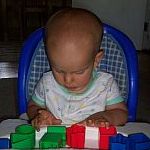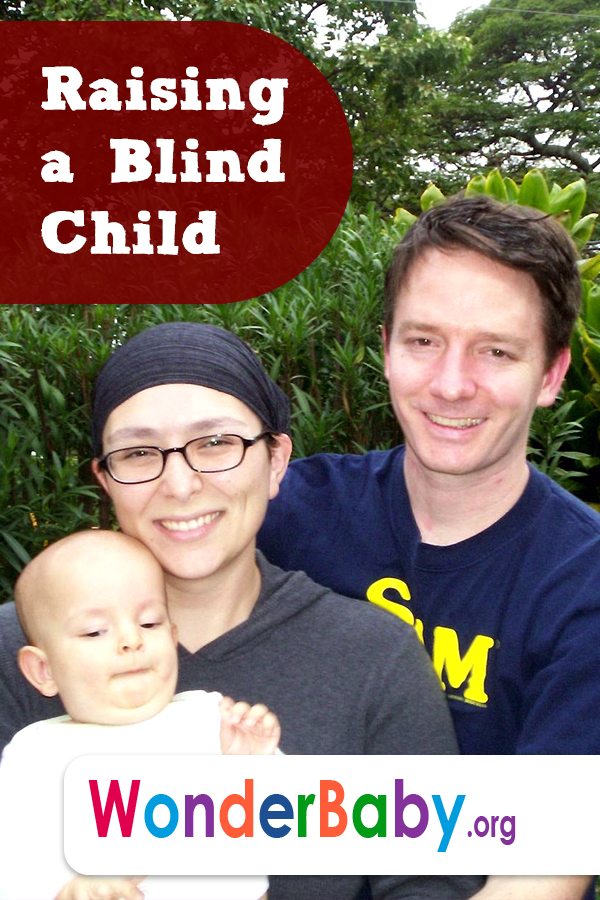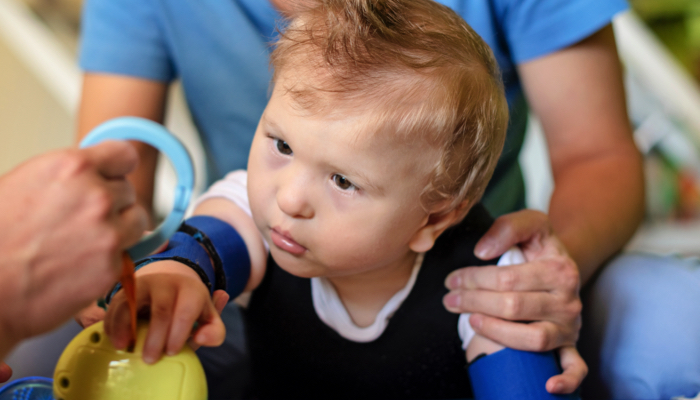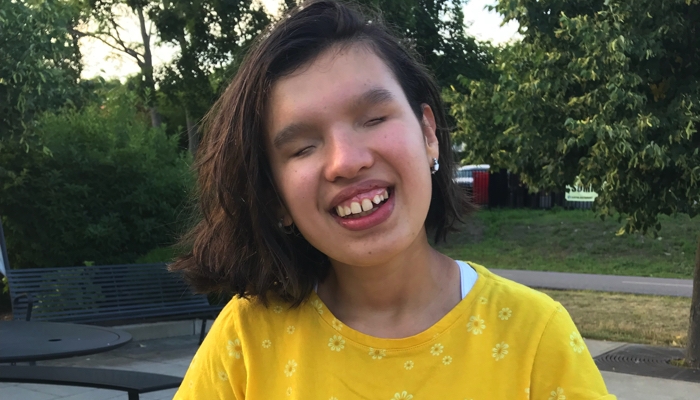Raising a Blind Child

This post may contain affiliate links; please see our terms of use for details.
Raising a blind baby may seem hopelessly difficult at first. For most parents, this isn’t something they expected or were prepared for.
At this point, you’re most likely searching for answers and preparing for what feels like an endless journey. Questions and emotions are running through your mind and you may feel like you’re in a rush to figure things out…
What do I do?
How can I cope?
How can I help my child?
Does it ever get easier?
What you need is support, understanding, and resources. I began this website as a means to provide all three to other parents of blind and disabled children, but as the site has grown I worry that the information may have become overwhelming. Where do you start?
I decided that it was time to put together a step-by-step resource guide, picking out the most pertinent articles and resources for parents with babies and young children searching for help.
Let’s get started!
Step 1: Find Support
The most important thing to do at this stage is find someone who understands what you are going through and can offer relevant advice. Whether you find a support group in your area through Early Intervention or join an online group (Yahoo Groups is a good place to start looking), the important thing is to connect with other parents.
Here is some advice from real parents of kids with special needs:
- Enjoy every minute, no matter what!
- Relax; Never forget you know your child best; Ask yourself if your concern now is going to matter when your child is an adult.
- It’s going to be ok…
- Don’t try to “fix” every problem. Take life one day at a time and enjoy every minute. Give yourself a break now and then.
- A sense of humor is a must!
- It’s amazing how this experience allows you to grow. I think I like myself better now, than I did years ago.
- What seemed to break our hearts at the beginning, was truly a blessing. Enjoy every precious moment.
- Don’t fret so much about what your baby can or can’t see; In the long run, it’s not really as important as you think.
- Don’t worry so much about “development” and throw the development charts out the window. Your child will grow up to be who he is going to be.
- Social workers are your friends. If you ever have a problem or a question, call your social worker or case manager first. If they don’t have the answer they can give you the number of someone who does.
Step 2: Read Some Articles
There’s so much information out there vying for your attention right now, from medical journals discussing genetic therapy to all the flyers and handouts your therapists have brought with them on home visits. Here’s a good thing to remember: You don’t have to read everything!
I’ve chosen a few articles here to cover some of the basic questions you may have right now. Browse through this list and see what grabs you.
Feel free to print these articles or share them with others. If you are a social worker organizing a support group for parents of visually impaired children, these articles might make good handouts.
 Try a Little Tenderness: Sorting through the Grieving Process
Try a Little Tenderness: Sorting through the Grieving Process
This article describes what it’s like when you first learn your baby has a vision impairment and helps you sort through your emotions.
 Help! My Baby Won’t Sleep!
Help! My Baby Won’t Sleep!
A common complaint I hear from parents of blind children is that they don’t sleep well. This article provides ideas to help get kids to sleep.
 From Cracks to Chasms: Maintaining Your Relationship When You Have a Disabled Child
From Cracks to Chasms: Maintaining Your Relationship When You Have a Disabled Child
This article gives practical advice on how to keep your relationship in tact while raising a special needs child.
 Yes You Can!
Yes You Can!
This is one of my favorite articles that I have written about how to help and encourage your child without pushing too hard.
 The Best Toys for Blind Babies
The Best Toys for Blind Babies
Playing with a blind baby really isn’t difficult. Just because they can’t see doesn’t mean they can’t interact. Try to focus on toys that are interesting to touch or make sounds and be sure to have fun and engage your child!
 Everyday Activities for Blind Children
Everyday Activities for Blind Children
You may think it will be hard to teach your blind baby about the world around them and really get them to understand how things work, but really all you need to do is get them involved in simple activities.
Step 3: Join Some Organizations
There are many private and government-run organizations out there designed to help you and your baby. Some organizations charge a small membership fee, but many are free. When you join you’ll receive an introductory package full of information and resources. This can be a great way to connect with other parents as well.
A good place to start is to locate and contact your state’s Commission for the Blind. Not all states have one, but most do. Find out what you need to do to get registered and meet with a case manager as soon as you can. They’ll be able to tell you about all the resources in your area and what services you’re eligible for. Of course, you should also register with your local Early Intervention office and meet them, as well.
Here are a few of our favorite organizations…
- American Foundation for the Blind: AFB provides support and services for the blind and visually impaired. Their web site offers a Services Locator and a great Bookstore. Some books published through AFB press can only be found here.
- National Federation for the Blind: NFB produces the often quoted publication Future Reflections, a magazine for parents and teachers of blind children. You can download the magazine directly to your computer for free.
- National Association for Parents of Children with Visual Impairments (NAPVI): NAPVI helps you help your child learn and grow. It’s a very encouraging organization. They also have a wonderful website, FamilyConnect, where you can find information about your child’s eye condition and connect with other parents. They also provide local state chapters that organize events and support groups.
- Foundation Fighting Blindness: FFB raises money to help fund research that will provide preventions, treatments and cures for people with vision loss. They’re a great organization to go to if you’re looking for more information about your child’s condition.
- National Organization of Parents of Blind Children: NOPBC, a division of NFB, supports, encourages, and shares information with parents of blind children. They’re great at connecting you with people and resources in your area.
Step 4: Educate Your Family
Your extended family and friends no doubt want to help, but may feel uneasy if they don’t understand what’s going on. A great way to begin educating your family is to print up some easy-to-read fact sheets and hand them out to any one who’s interested.
All of these fact sheets are from the Blind Babies Foundation and are in .pdf format. You will need Adobe Acrobat Reader to view them on your computer, or you can learn more about Adobe Accessibility and using screen readers to read .pdf files.
- Introduction
- Introducción (Español)
- Eye Specialists
- Especialistas en los Ojos (Español)
- How the Eye and Brain Work Together
- Como Funcionan Juntos el Cerebro y los Ojos (Español)
- Cortical Visual Impairment
- Impedimento Visual Cortical (Español)
- Retinopathy of Prematurity
- Optic Nerve Hypoplasia
- Hipoplasia del Nervio Óptico (Español)
- Albinism
- Albinismo (Español)
- Optic Nerve Atrophy
- Atrofia del Nervio Óptico (Español)
- Retinal Diseases
- Enfermedades de la Retina (Español)
- Vision Assessment
- Evaluación de la Visión (Español)
Step 5: Take a Break!
You’ve been working so hard trying to inform yourself about your new baby and what’s going on. It’s perfectly resaonable to feel overwhelmed and exhausted and more than sensible to stop and just enjoy yourself and your baby.
Don’t forget to slow down and just be you!
Read this article in Spanish: Lea este articulo en Español

Related Posts

Eye Conditions and Syndromes, Support, Visual Impairment
Coping with a Diagnosis: Emotional Support for Families with Visually Impaired Children
Families with emotional support are more resilient. Learn how to establish emotional support with peers, professionals, and the community to help your family thrive.

Special Needs, Visual Impairment
Why Early Intervention Is Critical for Blind Children
Children diagnosed with visual processing disorders, low vision, or blindness need specialized treatment. Early intervention programs can help.

Eye Conditions and Syndromes, Visual Impairment
Anophthalmia: Navigating the Path from Diagnosis to Adaptation for Parents and Their Children
Anophthalmia is a rare disorder that results in childhood blindness. Early intervention services are important to help your baby maximize their potential.